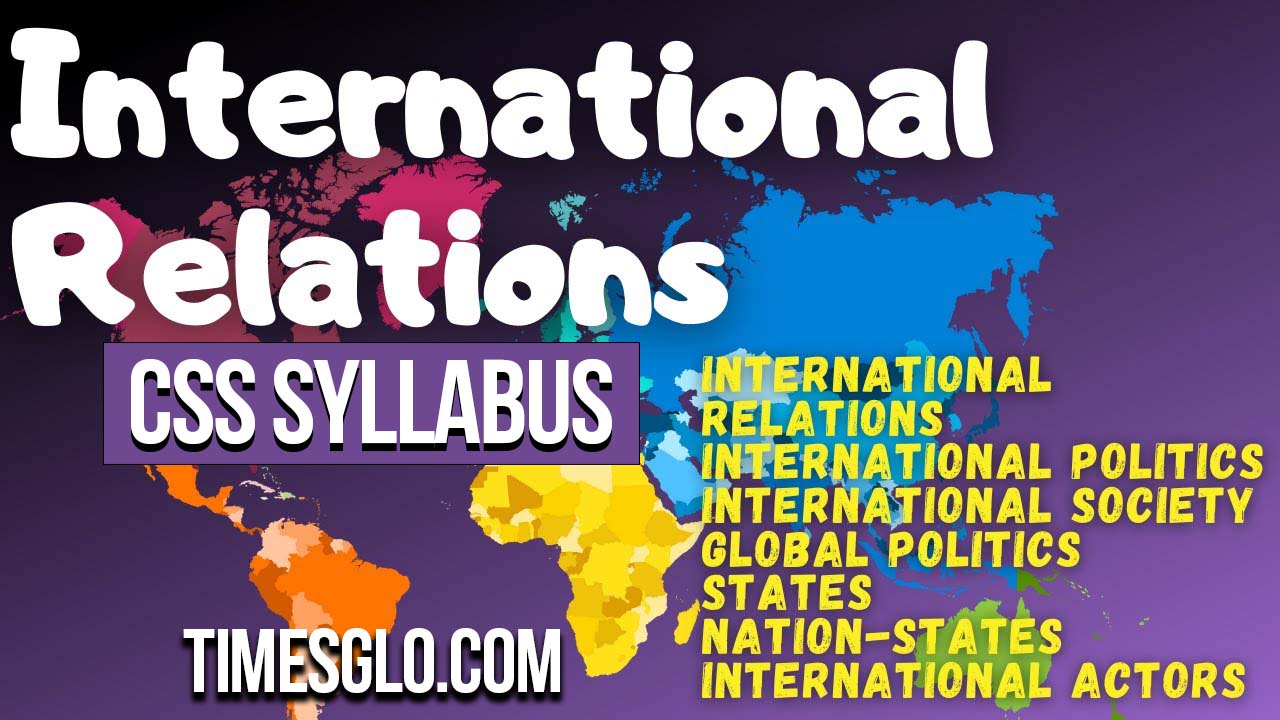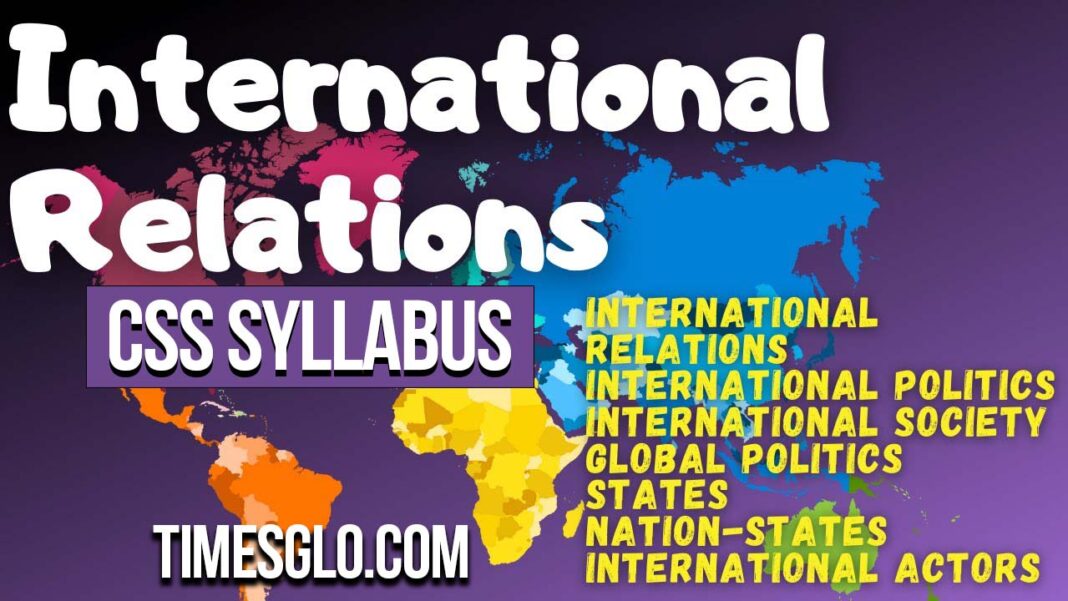
Introduction
Embarking on the journey of CSS examinations entails a critical focus on understanding the International Relations syllabus. Our guide is more than just an overview rather it’s a detailed exploration of the nuances within International Relations curriculum. For ambitious candidates, this resource is necessary to excel in the CSS examination.
Understanding the Core Concepts
In CSS understanding international relations stands as a cornerstone of navigating our interconnected world. Our comprehensive guide illuminates the intricate dynamics that shape interactions among nations, transcending geographical boundaries. It explores the multifaceted realms of diplomacy, trade, security and cultural exchange, offering an informed perspective on the complexities of international relations.
CSS International Relations 2023 – 2024 – Detailed Syllabus and Marks Distribution
A breakdown of the Latest Syllabus of International Relations 2023 – 2024 with Marks Distribution is given below:
Section—1 (Marks-100)
I. Introduction
- The Definition and Scope of International Relations.
- The Nation-State System
- Evolution of International Society
II. Theories and Approaches
- The Classical Approaches-Realism and Idealism
- The Scientific Revolution-Behavioral Approach, System Approach,
- Neo-realism, Neo-liberalism.
- Post-modernism, Critical Theory, Feminism, Constructivism
III. International Political Security
- Conceptualization of security in the Twenty-First century
- Power. Elements of National Power
- Balance of Power
- Foreign Policy: Determinants, Decision Making and Analysis
- Sovereignty
- National Interest
IV. Strategic Approach to International Relation
- War: Causation of War, Total War, Limited War, Asymmetric Warfare, Civil War,
- Guerilla Warfare
- Strategic Culture: Determinants of Pakistani Strategic Culture.
- Deterrence: Theory and practice with special reference to India and Pakistan
V. International Political Economy
- Theories in IPE: Mercantilism, Economic Liberalism, and Neo- Marxism
- Theories of Imperialism, Dependence and Interdependence discourse
VI. International political community
- Nationalism
- Internationalism
- Globalization
VII. Approaches to Peace
- Diplomacy
- International Law
- Arms Control /Disarmament and Nuclear Non proliferation Regime
VIII. International Political Institution
- United Nations
- International Monetary Fund (IMF)
- World Bank
- International Court of Justice
Section- II (Marks-100)
I. International Relation between two Wars
- Russian Revolution, Fascism, League of Nations, Second World War
II.Cold War
- Decolonization in Asia and Africa.
- Rise of United States and Soviet Union,
- Era of Tight Bipolarity, Détente and Loose Bipolarity, Revival of Cold War
III. Post Cold War
- End of History, Clash of Civilizations, Terrorism, Globalization, Unipolarity (New
- World Order) and Revival of Multi-Polarity
IV. International and Regional Organizations
- League of Nations, United Nations, Regional Organizations, EU, ASEAN,
- NAFTA, SAARC, SCO, OIC, ECO, WTO.
- Reforms in the United Nations, World Bank and the IMF
V. Foreign Policy of Selected Countries
- USA, Russia, China, UK, India, Pakistan and EU
VI. South Asia
- Peace-making and Peace-Building in South Asia: Analytical overview of peace
- processes between/among the states of South Asia especially between India and
- Pakistan.
- ndia and Pakistan: Overview of agreements and accords, Indus Water Treaty;
- Composite Dialogue; Sir Creek & Siachen border, Visa and People to people
- contact; Trade; and Role of civil society
- Afghanistan: Cold war theatre; Soviet Invasion and Mujahedeen; Geneva Accord;
- Post Cold War situation—Rise of Taliban, AL-Qeada & 9/11; Operation Enduring
- Freedom; The Bonn Process- Withdrawal
VII. Weapons of Mass Destruction
- Proliferation of Nuclear Weapons
- Nuclear Weapon States- Programs and Postures: Indian-Pakistan Nuclear
- Doctrines
- Nuclear Non –Proliferation Regime: International Atomic Energy Agency, Nuclear
- Non- Proliferation Treaty; Nuclear Supplier Group; Partial Test Ban Treaty;
- Comprehensive Test Ban Treaty; Fissile Material Cut-off Treaty
- Challenges of Non-Proliferation, Cooperation for Nuclear Energy
- The Missile Defence Systems and their impact on global strategic environment
- Militarization and Weaponization of Space.
VIII. Contemporary Issues
- Euro-Atlantic Vs. Asia Pacific: Great Power Policies
- Kashmir Issue
- Palestine Issue
In the realm of CSS examinations, a comprehensive grasp of international relations in pivotal. Our guide delves into the multifaceted world of international relations. It emphasizes comparative analysis, shedding lights on the diverse approaches nations take in diplomacy, conflict resolution and international cooperation which enable candidates to approach questions with nuanced understanding.
Mastering Examination Techniques
Thorough Understanding of Syllabus: Delve deep into the CSS syllabus, understanding not just the topics but also the weightage given to each. Prioritize subjects based on their significance and your comfort level.
Strategic Time Management: Allocate time wisely for each section according to its weightage and your proficiency. Practice timed mock exams to enhance speed and accuracy.
Mock Exams and Practice: Regularly attempt past papers and mock exams under timed conditions. Analyze your performance to identify strengths, weaknesses, and areas needing improvement.
Critical Thinking and Analytical Skills: Develop a knack for critical analysis. The CSS exams often demand critical thinking abilities to analyze problems and provide nuanced solutions.
Stay Updated: Keep abreast of current affairs, both national and international. Develop a habit of reading newspapers, journals, and reliable online sources to stay informed.
Essay and Writing Practice: Enhance essay-writing skills by practicing different types of essays and honing your ability to structure arguments logically and coherently.
Conclusion
Amidst the competitive domain of CSS examinations, our guide emerges as a guiding light for those aiming to master international relations. By fostering a deep comprehension of fundamental concepts, aiding in syllabus navigation, and honing examination strategies, our guide is tailored to propel candidates toward triumph. Embrace this comprehensive resource to not merely meet but surpass the expectations set by CSS examinations in international relations.

Editor Timesglo
Editor can be reached at editortimesglo@gmail.com







I very delighted to find this internet site on bing, just what I was searching for as well saved to fav